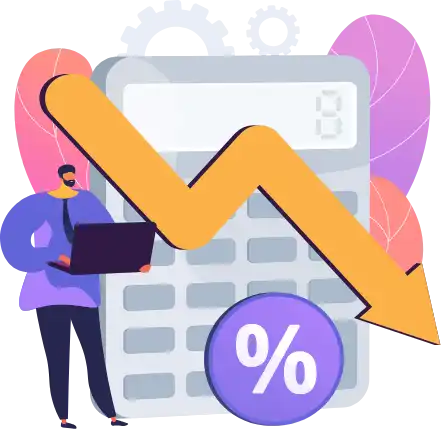Table of Contents
Save thousands each year, and gain control of what's yours.
Join our newsletter
to get trending content!
Are you wondering whether you can actually borrow from your IRA? Though “IRA loans” aren’t allowed under IRS rules, there are some creative workarounds—like the 60-day rollover—that people use. In this post, we’ll walk through what’s and what’s not allowed, when it makes sense, and how to avoid tax traps.
Key Takeaways
- You can’t borrow directly from an IRA — IRS rules classify that as a prohibited transaction.
- The closest workaround is the 60-day rollover rule: withdraw funds and return them to the same (or another eligible) IRA within 60 days to avoid taxes and penalties.
- If you miss the 60-day deadline, the withdrawal is treated as a taxable distribution (and a 10% penalty may apply if you’re under 59½).
- Roth IRAs provide more flexibility: you can generally withdraw contributions tax- and penalty-free (if rules are met), but earnings withdrawn early may be penalized.
- Before you consider a withdrawal or “loan,” explore alternatives like personal loans, 401(k) loans (if allowed), or negotiating with family — to avoid tax risk.
- Non-recourse loans tied to real estate (using a self-directed IRA) are possible in rare cases, but they are complex and have strict qualification rules.
Can You Borrow Against Your IRA?
No, you cannot borrow money against your IRA, as this is prohibited transaction by IRS. Unlike some employer-sponsored retirement plans, IRAs don’t allow for loans. If you take out money, it’s considered a withdrawal and will likely be subject to income taxes and a 10% penalty if you are under 59 ½ years old. However, there is a window that is described further in this blog. Stay tuned!
Can You Take a Loan from an IRA & Is It a Good Idea?
How to Borrow Against Your IRA?
If you’re 59½ or above, you can request a distribution from your traditional IRA without any penalty. However, since your original contributions were tax-deductible, you’ll need to pay income tax on the money you pull out.
However, if you own a Roth IRA, you can withdraw both contributions and earnings tax-free and penalty-free. For that, you need to be aged 59½ or above and have owned your Roth IRA for five years or more. With a Roth IRA, you can pull out the money from the account any time you want without any tax or penalty.
A critical aspect to keep in mind is that you have to withdraw only the contributions and not the investment earnings (such as interest you have earned on the contributions or dividends). If you withdraw your earnings early, you need to pay a 10% penalty and income tax on the amount you withdrew.
If you can repay the borrowed money in 60 days or less, you can use the 60-day rollover rule to your advantage. The IRS allows you to roll money from one IRA to another or pull money out from your IRA as long as you put it back in the same IRA within 60 days. Follow this IRA 60-day rollover rule, and you will not have to pay taxes and penalties.
Need help in choosing the correct way to borrow from your IRA?
Contact UsTwo conditions for 60-day rollovers:
When Should You Borrow Against Your IRA?
- Making a tax-free withdrawal from the initial investment in a Roth IRA
- Taking a loan on margin against stocks in your investment portfolio
- Loans from friends or family, who won’t charge you interest if you’re late by a day
What Happens if You Fail to Pay Back the IRA Loan?

Need help to get started?
Contact UsWhat are the Qualification Criteria for an IRA to Borrow Money?
- The real estate investment must make financial sense – meaning positive cash flow
- You should have 15% of the loan amount as a ready reserve
- Most non-recourse lenders will lend up up 60 – 65% LTV (loan to value).
What is the Process for IRA Loans?
- Check if the property is eligible for financing, complete the loan application, and provide recent IRA statements to the bank. If you’re married, include your spouse’s name.
- Review the procedures and documents required by your IRA custodian. Complete and sign these, and get the real estate contract signed by the custodian.
- Coordinate with the custodian to get funds directly transferred from your IRA to the financing bank for fees and appraisals.
- Ensure that the IRA is listed as insured, with a minimum policy term of one year. Provide the bank with invoice and policy copies at least two weeks before closing.
- After the bank reviews your application, verifies your documents, orders an appraisal and confirms the closing date, you will be notified if your loan is approved.
- After approval, your IRA custodian should execute your real estate documents as “read and approved” before closing, and then transfer the down payment and closing fees directly from your IRA to the title company.
What are the Other Alternatives to IRA Loans?
Family Loan
Negotiating favorable conditions on a family loan can be an option worth exploring, especially if flexibility is important to you. Remember: mishandling this might damage your vital family ties! It is critical to establish clear expectations and even draft an agreement that protects both parties involved.
Personal Loan
Are you looking at having specific funds repayable over time instead? Generally speaking, personal loans tend to carry lower rates compared to obtaining via fluctuations when opting strictly plucked amidst cash advances.
Credit Card Cash Advance
In need of rapid cash? A credit card cash advance may sound enticing because it does not require a hard credit check (and hence has no influence on your credit score). However, although reasonable, setting monthly payments is a possibility.
However, you must first compare these interest rates and fees to the expense of withdrawing funds from an IRA early! Prepare for probable fee increases of up to 5%. Also, keep in mind that flat charges may be applied to percentage-based ones.
401(k) Loans
Have you ever considered borrowing from your 401(k)? If your plan allows it, you may withdraw up to 50% of your savings within a year, up to a maximum of $50,000. You’d have to repay the money plus interest within five years. But there’s an unusual bonus: the interest is paid back into your account.
The good news is that this choice carries no taxes or penalties. However, if you quit your present work without fully repaying the loan, you may face taxes and a 10% penalty (if under 59½). One critical thing to remember is that the information provided in this blog is general. Thus, you should consult with a financial counselor or tax specialist before making any choices.
Our financial experts will be more than happy to provide you with personalized advice, depending on your situation.
Contact UsFAQ
Is There any Penalty for Taking a Loan Against an IRA?
As long as you pay back the loan within 60 days, tax and penalties don’t apply. Still, you may be liable for a 6% excess contribution fine if you make more than one rollover within 12 months for each IRA.
Can You Borrow Against Your IRA to Buy a House?
Unfortunately, loans from an IRA are not permitted. However, there is an alternate option: you can withdraw funds from your IRA to purchase a home. It’s vital to remember that the withdrawal is taxed and may be subject to a 10% IRS penalty if you’re under the age of 59 1/2.
But there’s some good news: if you return the whole amount within 60 days, you can avoid taxes and the IRS penalty.
Can You Borrow From a SIMPLE or SEP IRA?
SIMPLE and SEP-IRAs, like standard and Roth IRAs, do not allow borrowing. However, you may choose whether to withdraw or rollover your money. It’s worth noting that during the first two years, the IRS only accepts SIMPLE IRA rollovers to other .
If you choose to roll it into a non-SIMPLE account, the distribution is taxed as income. As with other forms of IRAs, you may only make one rollover each year. So, before making any retirement savings selections, make sure to prepare ahead of time and evaluate all of your possibilities!
Is it Wiser to Borrow From an IRA or 401(k)?
If you want to borrow money from your retirement accounts rather than withdrawing and then refilling them, you may do so with a 401(k) account. However, keep in mind that there are precise criteria that dictate how much you may borrow and when you must repay it.
To gain more information about this, contact your 401(k) administrator. They can provide you with all of the relevant information for borrowing from your 401(k).
Can You Take a Loan From an Inherited IRA?
Unfortunately, borrowing from an inherited IRA is not permitted. Inherited IRAs are subject to particular laws and regulations that govern how the assets may be accessed and dispersed.
Typically, you can either take required minimum distributions (RMDs) depending on your life expectancy or remove the entire balance within a specific term. However, borrowing against the inherited IRA is not an option for you.
Can You Borrow From an IRA to Purchase a Car?
There is no explicit provision allowing you to borrow from your IRA to buy an automobile. However, as previously stated, it is theoretically allowed for you to take funds from your IRA temporarily in order to acquire a car. You can subsequently return all proceeds to your IRA within 60 days.
It is essential to highlight, however, that utilizing cash from your retirement account in this manner should be carefully studied and may not always be desirable until circumstances allow for such activities – especially if you are still working or expect to retire in the future.

